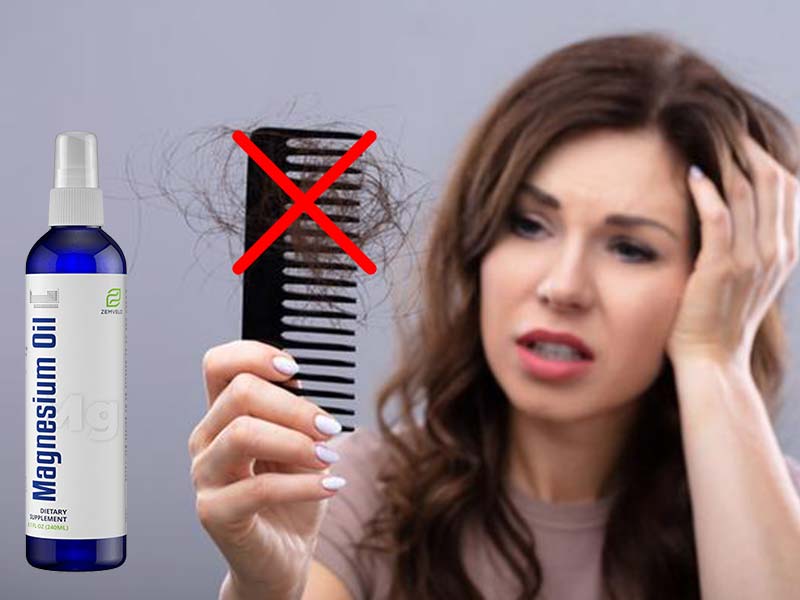Nowadays, people tend to use oils to improve their appearance, including hair. That is the reason why so many people use essential oil to boost hair growth, add shine, or reduce hair loss. Besides essential oils, a type of oil called magnesium is also popular. In our article today on Lewigs, we would like to share with you much interesting information about magnesium oil, especially magnesium oil for hair. Therefore, if you have hair problems such as hair loss, this article is for you. Hope you will like it!
Table of Contents
What Is Magnesium Oil?
Magnesium oil is not an essential oil like coconut oil or jojoba oil. It is a concentrated solution of salt and magnesium chloride. We can apply this oil on our skin.
Magnesium oil is used widely due to magnesium oil benefits on health such as relieving pains and cramps, reducing anxiety and depression symptoms, treating morning sickness, etc.

You can make magnesium oil by yourself with magnesium chloride flakes and distilled or purified water. Or you can buy it at the store or pharmacy or online market. It is easy to find magnesium oil. The most important thing you have to remember is to choose good quality magnesium oil. If not, it will not only have no benefits on your hair but also cause hair problems.
Magnesium Oil Benefits Hair
Reduce Inflammation
Inflammation on your scalp can lead to many head problems such as the dry scalp, split ends, dandruff, etc. It is annoying not only for your appearance but also for your daily feeling. Magnesium oil has anti-inflammatory properties, so it is useful for treating infections on your scalp. The healthier your scalp is, the stronger your hair is. One of the most common scalp issues is calcium build-up caused by stacking layers of hair products on your hair as well as hard water. If you are suffering from calcium build-up, your scalp will be dry and flaky, resulting in hair loss. Magnesium oil is helpful to slow calcium production and improve calcium circulation. Calcium will go to your bones where it is needed instead of staying a lot on your hair and scalp.
Prevent Hair Loss
Many studies show the relationship between magnesium deficiency and hair loss. The reason is that a lack of magnesium can disrupt the mineral homeostasis. This can lead to problems in the protein-producing process, leading to hair loss. As a result, it is essential to eat foods rich in magnesium such as rice, spinach, almonds, avocado, etc. Besides, applying magnesium oil for hair on your scalp is a good way to help the scalp absorb magnesium. In addition, magnesium oil helps reduce stress – a common cause for hair loss. It contains a soothing effect to lower cortical levels, then reduce stress and anxiety. Many people add magnesium oil to baths or use it for massages to relax.

Stimulate Hair Growth
If you wonder whether does magnesium oil work for hair growth, the answer is yes. When using magnesium oil, do not forget to massage your scalp because it is an effective method to promote blood circulation on your scalp. Thanks to it, your hair follicles can receive more nutrients and oxygen, leading to more new hair. As mentioned above, magnesium deficiency causes protein synthesis problems. In this case, using magnesium oil helps your body produce protein normally. Protein creates healthy hair. Therefore, magnesium contributes to stimulating hair. Furthermore, according to a study conducted in Germany, magnesium oil contributes to hair increase.
Prevent Grey Hair
Protein synthesis also plays an important role in producing melanin, a substance that prevents your hair from turning grey.
Other posts:
- 8 Daily Haircare Habits To Foster Hair Regrowth For Women
- Have You Ever Tried Steam Treatment For Scalp?
- Are Hair Implants Really Worth Taking? | Implant Vs. Transplant
- Lanolin For Hair – Everything You Need To Know About
- Activated Charcoal For Hair – Is It A Wise Choice?
How To Use Magnesium Oil For Hair
You need to dilute 10-15 drops of magnesium oil in water. After that, apply this oil to your scalp. Do not forget to massage your scalp gently to boost blood circulation. Then, wash your hair with shampoo after about 30 minutes. Do not let the oil on your scalp over 30 minutes because it can dry your hair.
You can also take a magnesium oil supplement. However, it is important to consult the doctor before taking this supplement to avoid side effects on your health.

Magnesium Oil For Hair – Side Effects
Before applying magnesium oil on your scalp, it is essential to test it out on a small patch of skin to see. If you do not have any uncomfortable feelings, you can use this oil. Some people report that they have stinging or a lingering burning sensation.
Note
To have beautiful and strong hair, you should keep your body healthy from the inside.
– Have a healthy diet: Remember to take enough nutrients everyday, especially vitamins and minerals. Lack of nutrients can lead to weak hair and hair loss. Taking enough water is also important to keep your body and your scalp hydrated and avoid dry hair.
– Get enough sleep: A good quality sleep is good for your health in general and your hair in particular. Long-time sleep deprivation makes your brain exhausted, resulting in anxiety and stress – two common causes of hair loss.
– Control stress: You should manage your stress regularly with your hobbies.
In addition, your hair care routine plays an important role in keeping your hair healthy.
– Reduce heat: You should avoid using too much hot water or heat hair styling tools. If necessary, do not forget to apply a heat protectant.
– Choose suitable hair care products: Each hair type requires different hair care products. Do not choose the product you like, choose the product your hair wants! Using wrong products can lead to hair damage. If you have a sensitive scalp, you can consider the products based on natural ingredients.
In conclusion, if you are suffering from hair loss and thin hair, you can try to use magnesium oil for hair. However, remember to test a small amount of magnesium oil before applying it on your scalp to avoid side effects. We hope that magnesium oil will help you solve your problem. If you have any questions or comments about our article today, please leave them above. We are happy to hear from you.


